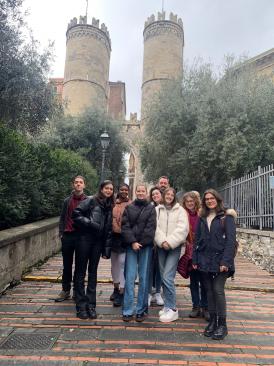
Rennes 2 students in front of the Porta Soprana, one of the ancient gates of the city, next to the house of Christopher Columbus;
Eight students enrolled in an L1 program for beginner’s Italian were recently able to take advantage of a newly constructed language and culture course offering in conjunction with the University of Genoa. The innovative program provides students with a mix of on-site classes with Rennes 2 faculty of the Italian Department as well as a number of hybrid activities via videoconferences with teachers of the Department of Italian Studies (DIRAAS) of the Genoese university. The pedagogical activities are structured so that all students of the class have the opportunity to become familiar with the basics of the language and civilization. Then, those who participate in the international mobility component of the program continue to undertake 50 hours of Italian language and civilization courses during their two-week visit to the sixth-largest city in Italy. Participation in the mobility itself provides them with 3 ECTS once they have successfully completed a final exam, validating their university curriculum in the subject-matter.

Rennes 2 students in class in one of the rooms (called "aula dell'ex biblioteca") of the Department of Italian Studies.
This short-term hybrid mobility program is the first of its kind at Rennes 2 for outgoing students and will be continued to be offered to new students next year. It is also part of the latest Erasmus+ program and the internationalization objective of Rennes 2 University, in the framework of the language policy of the new 2022-2027 institutional project. This type of program contributes to the internationalization objective "at home" of the institution through its hybrid component, to the construction of the European Higher Education Area, as well as to the fight against discrimination, with priority being given to students in economically fragile situations. Although the short mobility element is not obligatory, those who do take part benefit from financial assistance, facilitating access for those who are unable to participate in longer mobility programs due to the costs typically associated with such programs. One goal of this and other similar programs is to increase the number of students who ultimately decide to continue their studies in a speciality subject throughout the Bachelor’s level or higher.




